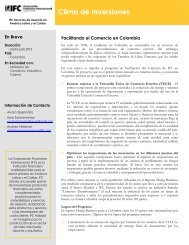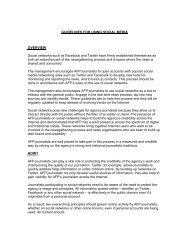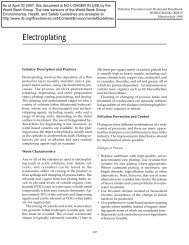A Self-Assessment Guide for Health Care Organizations - IFC
A Self-Assessment Guide for Health Care Organizations - IFC
A Self-Assessment Guide for Health Care Organizations - IFC
Create successful ePaper yourself
Turn your PDF publications into a flip-book with our unique Google optimized e-Paper software.
Why are Standards Important<br />
Why should private health care providers be interested in promoting<br />
standards of quality, safety and ethics<br />
Of course, the consequences of poor standards can be disastrous. Stories<br />
of unethical business practices are increasingly common in the news<br />
media and have resulted in the demise of individuals and whole health<br />
care organizations. No hospital executive wants to find their hospital or<br />
one of their staff in the news because of a patient being caused serious<br />
injury or death.<br />
Ethical and responsible conduct is not only important <strong>for</strong> public relations,<br />
but it is also a necessary element in risk management. The reputation<br />
of a health care organization is critical in influencing patients seeking<br />
services. And, <strong>for</strong> those organizations aspiring to attract medical tourism,<br />
a good reputation is imperative. Hospitals with good reputations also<br />
benefit from lower recruitment and orientation costs, as staff retention<br />
is high and the most qualified professionals tend to seek jobs with them.<br />
Solid, supportive leaders who work closely with the staff to improve<br />
standards also find that patient and staff satisfaction increase. These<br />
outcomes create a sense of achievement and pride in the organization.<br />
Quality improvement is linked to per<strong>for</strong>mance improvement because<br />
improving quality tends to reduce costs. For example, when clinicians are<br />
uncertain about the best course of action to take, they tend to do more –<br />
e.g. more tests, more procedures and more observation. There<strong>for</strong>e, health<br />
care organizations that undertake more analysis and promote evidencebased<br />
medicine are more likely to reduce waste. In fact, some health<br />
professionals state that “the opposite of quality is waste” — and waste<br />
reduction requires removing process flaws and non-value adding processes.<br />
From a commercial perspective, all of these outcomes can translate into<br />
financial dividends.<br />
Governance and Standards<br />
What is governance<br />
Good governance is of fundamental importance to improving standards<br />
of quality and safety.<br />
Governance is defined as the rules, processes and laws by which an<br />
organization is operated. Typically, there are two groups that make up<br />
the governance structure of an organization:<br />
These groups share the responsibility of setting the strategic direction <strong>for</strong><br />
the organization and <strong>for</strong> achieving its goals. They are accountable <strong>for</strong> the<br />
quality of services and the safety of the patients, visitors and staff.<br />
The leaders of health care organizations carry out the responsibilities of<br />
governance through their planning, decision-making, and per<strong>for</strong>mance<br />
management functions.<br />
Principles of good governance<br />
Principles of good governance include 1 :<br />
Stakeholder<br />
rights:<br />
Integrity &<br />
ethical behavior:<br />
Disclosure &<br />
transparency:<br />
Per<strong>for</strong>mance<br />
orientation:<br />
Stakeholders include investors and<br />
employees, as well as patients,<br />
community members and<br />
organizations, and vendors. Some<br />
rights are accorded by law and others<br />
may be established by the<br />
organization. Stakeholders should<br />
know their rights and have a means<br />
of redress <strong>for</strong> violation of their rights.<br />
Decisions are based on the values held<br />
by an individual or organization. It is<br />
important, then, that the<br />
organization defines and agrees on a<br />
shared set of values and code of<br />
conduct 2 , such that decisions are<br />
based on a common understanding.<br />
The organization implements<br />
procedures to independently verify<br />
and safeguard the integrity of its<br />
operating and reporting systems.<br />
Disclosure of material matters<br />
concerning the organization should<br />
be timely and balanced to ensure that<br />
investors and other stakeholders have<br />
access to clear, factual in<strong>for</strong>mation.<br />
The organization should establish<br />
indicators to determine whether goals<br />
and objectives are being met. All<br />
aspects, including financial,<br />
management, and clinical<br />
per<strong>for</strong>mance, should be measured to<br />
provide an overall assessment of the<br />
organization.<br />
• the governing body (e.g. board), and<br />
• the chief executive officer (or president) and senior managers.<br />
In the case of health care organizations, clinicians (e.g. medical and<br />
nursing staff) also play a key role in governance. For example, physicians<br />
who provide care in a health care facility are normally supervised by<br />
a licensed medical practitioner; accordingly hospitals have medical<br />
directors to fulfill this senior management oversight role. By driving<br />
the clinical decisions of the organization, physicians also control the use<br />
of resources — such as medications, procedures and tests — thereby<br />
making a significant impact on the business.<br />
Responsibility &<br />
accountability:<br />
Mutual respect:<br />
The leadership of a health care facility<br />
is ultimately responsible <strong>for</strong> providing<br />
safe, high quality care. It is<br />
accountable <strong>for</strong> its actions to the<br />
relevant stakeholders, e.g. investors,<br />
health authorities, community, and<br />
individual clients.<br />
Leaders should demonstrate mutual<br />
respect and civility with a goal of<br />
building trust. 3<br />
1<br />
OECD (2004) OECD Principles of Clinical Governance, OECD Publications: Paris. Available at www.oecd.org/dataoecd/32/18/31557724.pdf<br />
2<br />
<strong>IFC</strong>’s proposed Code of Conduct <strong>for</strong> <strong>Health</strong> <strong>Care</strong> <strong>Organizations</strong> is included in Appendix I.<br />
3<br />
The Governance Institute. (2009) Leadership in <strong>Health</strong> <strong>Care</strong> <strong>Organizations</strong>: A <strong>Guide</strong> to Joint Commission Leadership Standards. A Governance Institute White<br />
Paper. The Governance Institute: San Diego, Ca.<br />
<strong>IFC</strong> <strong>Self</strong>-<strong>Assessment</strong> <strong>Guide</strong> <strong>for</strong> <strong>Health</strong> <strong>Care</strong> <strong>Organizations</strong> 7














![Print a two-page fact sheet on this project [PDF] - IFC](https://img.yumpu.com/43449799/1/190x245/print-a-two-page-fact-sheet-on-this-project-pdf-ifc.jpg?quality=85)


